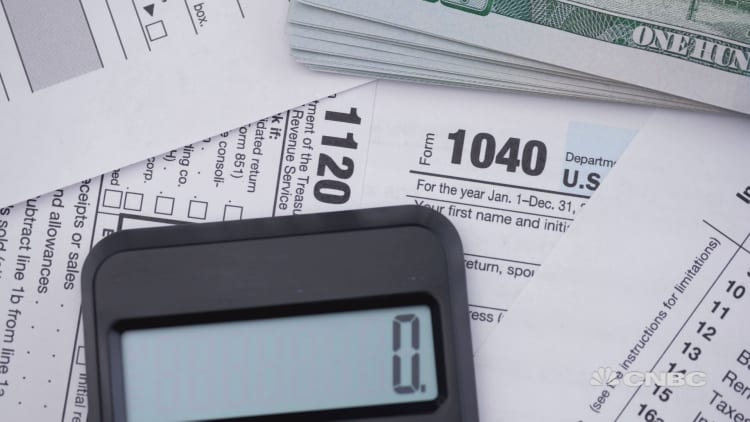The clock is ticking for American taxpayers who hold money overseas: Report your foreign accounts to the IRS and Treasury, or else.
Along with the regular tax filing requirements that everyone else must face, individuals who hold financial accounts in foreign countries must submit additional reports to federal agencies.
Americans with accounts abroad have until April 17 to file a report of Foreign Bank and Financial Accounts (FBAR) with the Treasury's Financial Crimes Enforcement Network. Those who fail to make it can get an extension up to October 15.
These individuals must also file additional reports with the IRS as they turn in their income tax returns.

Reporting requirements for foreign accounts have become a high-profile issue.
Last week, special counsel Robert Mueller filed a slate of charges against two former Trump campaign officials, Paul Manafort and Rick Gates. Among the allegations were charges of "failure to file reports of foreign bank and financial accounts."
After Gates pleaded guilty to conspiracy and lying, Mueller moved to dismiss more than 20 criminal counts against him on Tuesday, including the charge for failure to report the foreign accounts.
Gates' attorney, Thomas C. Green, senior counsel at Sidley Austin, declined to comment.
Calls and emails to Manafort's lawyers, Kevin M. Downing and Thomas E. Zehnle, were not immediately returned.
Here's what you need to know to ensure you report your foreign accounts correctly to the Treasury and the IRS.
Know the FBAR
"People come to me all the time with their common-sense hat on: How much do I owe?" said Christopher J. Byrne, a partner at UHY LLP in New York.
"But the thing that's more important is the informational forms, including the foreign bank and financial accounts report," he said. "These forms are penalty-sensitive, and if they get overlooked, it's hard to dig yourself out."
You must submit an FBAR if you had an interest in or signature authority over at least one account outside the U.S., and the aggregate value of all the foreign accounts exceeded $10,000 at any time in the year.
It'll cost you if you skip this form.
You could be on the hook for a penalty as high as $10,000 for nonwillful violations. Those who knowingly flout the requirement may be charged a penalty of $100,000 or 50 percent of the balance in the account — and they may also face criminal penalties.
File with the IRS
If you're required to submit an FBAR, you may also need to turn in a statement of specified foreign financial assets — Form 8938 — to the IRS when you file your income tax return by April 17.
Be aware that this form is subject to reporting thresholds, and that those thresholds will vary based on your filing status and whether you live in the U.S.
Single taxpayers who live overseas are required to file Form 8938 if the total value of their foreign financial assets exceeds $200,000 on the last day of the tax year ($400,000 for married-filing-jointly) or if it exceeds $300,000 any time during the year ($600,000 for spouses who file jointly).

Single filers who live in the U.S. must turn in Form 8938 if the total value of their foreign financial assets exceeds $50,000 on the last day of the tax year ($100,000 for joint filers) or if the value exceeds $75,000 any time during the year ($150,000 for couples filing jointly).
Taxpayers who fail to disclose these accounts face a penalty of up to $10,000.
If they continue to withhold information even after the IRS notifies them of a failure to disclose, these account holders may face a maximum penalty of $60,000, along with criminal penalties.
Common errors
The most common error filers make tends to be when they fail to report one of their accounts on the FBAR, according to David McKeegan, an expatriate and co-founder of Greenback Expat Tax Services of New York and Bali, Indonesia.
In that case, you will need to file a delinquent FBAR and include an explanation to the Financial Crimes Enforcement Network as to why you're filing late.
Further, American filers who lived overseas, invested some of their money, and then returned to the U.S. are also likely to get tripped up on reporting requirements around tax time.
"One of the tricky things people get in trouble with is if they invest in foreign mutual funds," said McKeegan. "That can be a big red flag when we prepare tax returns for people."
That's because these funds are subject to different reporting requirements compared with their U.S. mutual fund counterparts.
Filers also get confused about which forms they're required to submit and where to send them: Don't forget that your FBAR must go to the Treasury's FinCEN bureau, and your Form 8938 goes to the IRS.
"It isn't illegal to have these foreign accounts, but you must file," McKeegan said.
More from Personal Finance:
Grab these breaks on your tax return while you still can
What tax pros say you should do before heading their way
Five ways people try to cheat on their taxes


